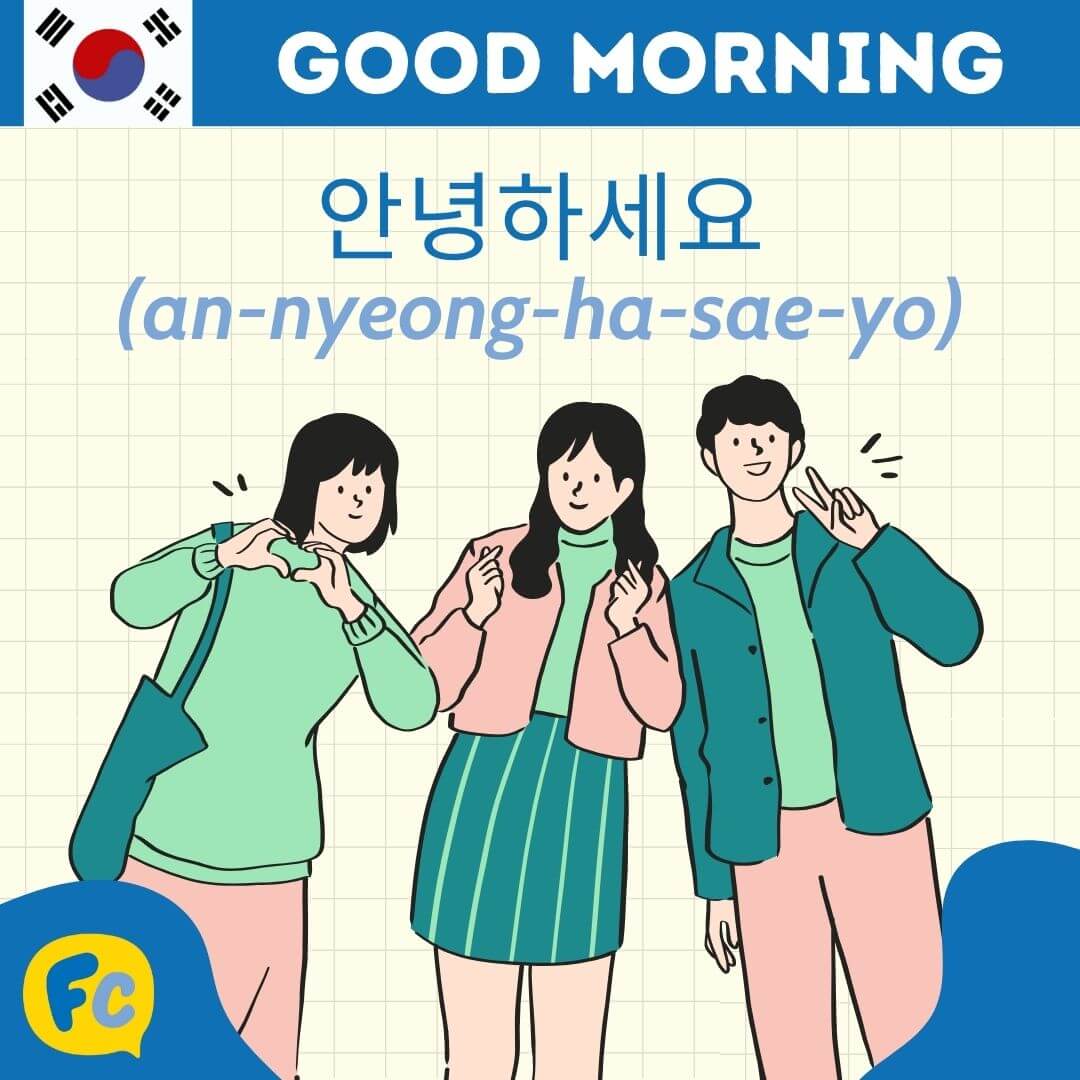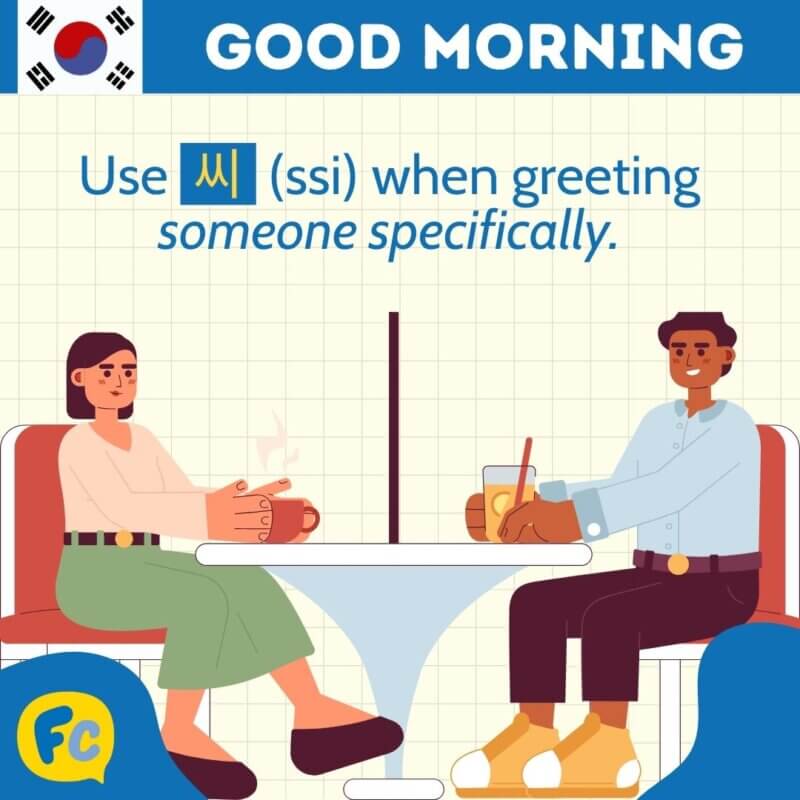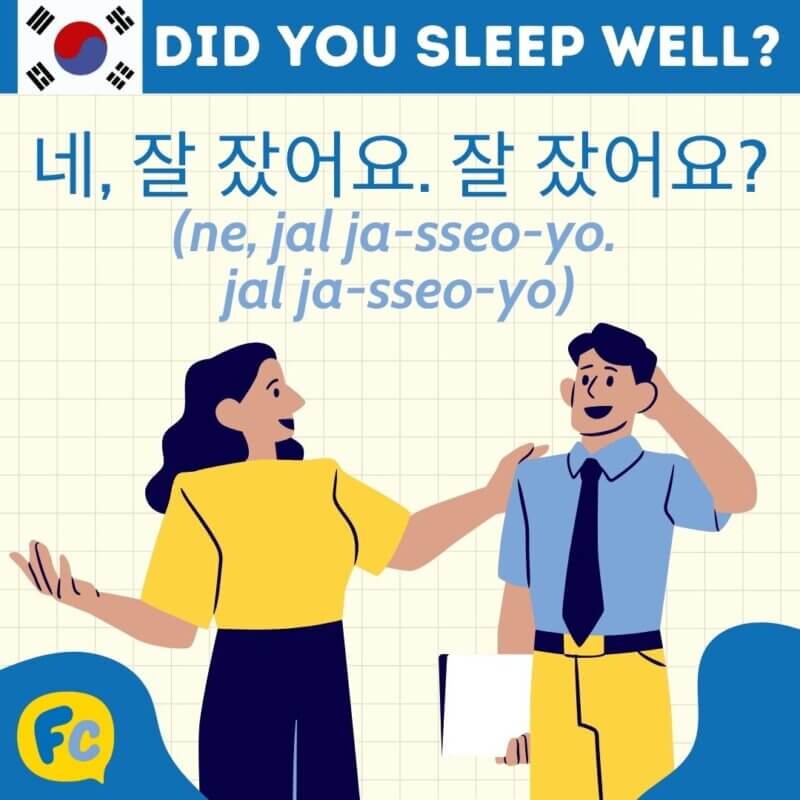Greetings in Korean: How To Say Good Morning in Korean
Brighten Your Day with Good Morning in Korean || Plus Audio and FREE Quiz ✅

🔎 Good morning is such an essential phrase we use universally.
These words come naturally due to how strongly they are associated with the start of a morning. I can’t think of a better way to greet someone!
In Korean ‘good morning’ could be expressed in different ways without literally saying the word morning. Read along to discover the natural way Koreans greet people.
Let’s discover how to say “Good Morning”
or 안녕하세요 in Korean!
⬇️Interested in one of the contents below? Clicking on the link will bring you to your preferred section!
Good Morning in Korean | 3 Common Ways to Say Good Morning
Good Morning in Korean | Other Ways to Say Good Morning
Good Morning in Korean | How to Reply to Good Morning
Good Morning in Korean | Quiz
Good Morning in Korean | FAQ
Good Morning in Korean || 3 Common Ways to Say Good Morning
안녕하세요 (an-nyeong-ha-sae-yo)

It might be a bit surprising but you won’t often hear Koreans greet you with 좋은 아침 which literally translates to good morning.
👉The most common way to greet someone in the morning or on any given day is 안녕하세요 (an-neyong-ha-sae-yo). This expression could be used both formally and casually. Just knowing how to say 안녕하세요 (an-neyong-ha-sae-yo) can get you by from morning till evening.
Let’s dig a little deeper into where this expression originates.
안녕 (安寧) means calm and peaceful.
This is an expression that derives from a question asking, are you peaceful? Or in more current terms, how are you?
안녕하세요, 잘 지내세요? (an-neyong-ha-sae-yo, jal ji-nae-se-yo)
👉 So if you say 안녕하세요 (an-neyong-ha-sae-yo), you are greeting someone with a hello and how are you at the same time. You may also add the expression 잘 지내세요 (jal ji-nae-se-yo) – how are you and say:
But this is usually used when you haven’t met someone for a long time and want to emphasize how life has been. But for a casual good morning, 안녕하세요 (an-neyong-ha-sae-yo) will do the trick.
In addition, as the word 안녕 (an-nyeong) could mean how are you, you would sometimes hear Koreans asking 부모님은 안녕하세요? (bu-mo-nim-eun an-neyong-ha-sae-yo) meaning ‘Are your parents doing well?“
부모님은 안녕하세요?
(bu-mo-nim-eun an-neyong-ha-sae-yo)안녕하십니까 (an-nyeong-ha-shim-nik-ka)
👉 Besides the usual 안녕하세요 (an-neyong-ha-sae-yo), there is a much formal form called 안녕하십니까 (an-nyeong-ha-shim-nik-ka). You would use this form for someone you want to show the highest level of respect. Think of a corporate executive, a President of a country, a university professor, or in-laws.
Koreans tend to show a great amount of respect to teachers or professors.
So we always recommend using the most polite form to them.
안녕하십니까 선생님
(an-nyeong-ha-shim-nik-ka seon-saeng-nim)
안녕 (an-nyeong)
👉 Imagine meeting your future in-laws for the first time. In Korean, it is normal to address future in-laws or your friend’s parents as mother or father. The safest way is to address them in the most formal way possible.
안녕하십니까 아버님
(an-nyeong-ha-shim-nik-ka ah-beo-nim)안녕하십니까 어머님
(an-nyeong-ha-shim-nik-ka eom-mo-nim)Another situation you will use this form is during a speech or when addressing many people in a crowd.
안녕하십니까 여러분
(an-nyeong-ha-shim-nik-ka yeo-reo-bun)Moving on to the most informal and casual way to say good morning, 안녕 (an-nyeong). This would only be used for your closest friends or siblings.
✨ A great tip to remember when you feel confused about which greetings to use is simply repeating what they said!
If someone greets you with 안녕하세요 (an-nyeong-ha-sae-yo), you greet back with 안녕하세요 (an-nyeong-ha-sae-yo). If someone greets you with 안녕 (an-nyeong), you say 안녕 (an-nyeong) too.
If you are the one initiating the conversation say 안녕하세요 (an-nyeong-ha-sae-yo), the go-to greeting in Korean.

63 Korean Words You Never Knew You Knew!
Did you know you already know loads of Korean words and that’s thanks to the inclusion of Korean Loanwords in the language. Here’s our favourites.
Good Morning in Korean || Other Ways to Say Good Morning
좋은 아침입니다 (jo-eun ah-chim-ip-ni-da) – Good morning
👉 Another way to say good morning is 좋은 아침입니다 or 좋은 아침 which literally translates to good morning.
Natives will usually use this in a corporate setting when greeting a group of colleagues at the same time. A perfect scene to use this would be you walking into the office with many colleagues sitting at their desks. While reaching to your desk you could greet everyone by saying 좋은 아침입니다 (jo-eun ah-chim-ip-ni-da).
For a closer circle of colleagues, you can also say 좋은 아침 (jo-eun ah-chim) omitting the formal ending 입니다 (ib-ni-da).
안녕히 주무셨어요? (an-nyeong-hee ju-mu-syeo-sseo-yo)
👉 Another favorite way Korean like to say good morning is 안녕히 주무셨어요. (an-nyeong-hee ju-mu-syeo-sseo-yo). Asking how they slept is a polite gesture that shows interest in their well-being.
안녕히 주무셨어요?
(an-nyeong-hee ju-mu-syeo-sseo-yo)Koreans often use this to greet their parents or elders in the morning right when they wake up. This isn’t used to greet someone mid-morning.
어머니 잘 주무셨어요?
(eo-mo-ni jal ju-mu-syeo-sseo-yo)잘 잤어요? (jal ja-sseo-yo)

잘 잤어요? (jal ja-sseo-yo) is a polite way to say good morning to people closer to you.
If there is a friend or superior you are close to but still want to show politeness, this expression is a great one.
Use the honorific 씨 (ssi) if you are greeting someone specifically.
영미씨 잘 잤어요?
(Young Mi-ssi jal ja-sseo-yo)잘 잤어? (jal ja-sseo)
Here is the most casual form. Use this to people you are most comfortable around and don’t need to show formality.
As with the example above, here is how you will add a name to your greeting.
Example: 영미야 잘 잤어? (Young Mi-ya jal ja-sseo)
👉 For casual forms, adding names rather than greeting them outright with ‘good morning’ sounds more gentle. Next time you are greeting a close friend, try this method!
Good Morning in Korean | How to Reply to Good Morning
👉 If someone greets you with one of the “Did you sleep well” morning greetings, here is how you can reply.
안녕히 주무셨어요?
(an-nyeong-hee ju-mu-syeo-sseo-yo)네, 잘 잤어요. 안녕히 주무셨어요?
(ne, jal-ja-sseo-yo. an-nyeong-hee ju-mu-syeo-sseo-yo)✍ Please note that honorifics are used to show respect to others, so you wouldn’t use them to yourself.
You can see that we didn’t repeat the exact words back but instead used a less formal way to answer them.
잘 잤어요?
(jal ja-sseo-yo)네, 잘 잤어요. 잘 잤어요?
(ne, jal ja-sseo-yo. jal ja-sseo-yo)
잘 잤어?
(jal ja-sseo)응, 잘 잤어. 잘 잤어? (응, 잘 잤어. 너는?)
(eung, jal ja-sseo. jal ja-sseo)Mornings to some could be one of the toughest in a day. Lighten up their day with a morning greeting.
📍 Remember, Koreans value respect very much so it’s important not to offend anyone with the wrong forms. Also, this is a great way to learn about other cultures.
So make sure to start your day with a smile and a “good morning” but of course, first, coffee.

Coffee in Korean ☕️ The Complete Guide to Getting Your Daily Dose of Caffeine
Must-Know Vocab and Phrases for Ordering Coffee in Korean || PLUS Quiz! Can you say coffee in Korean? With more than 18,000 coffee shops in Seoul alone, it’s safe to say South Korea is deep in a coffee craze. With…
USEFUL PHRASE
Here is a small list of vocabulary for you👇
| Korean Phrase | TRANSLITERATION | English Meaning |
|---|---|---|
| 안녕하세요 | an-nyeong-ha-sae-yo | Hello (formal) |
| 안녕하십니까 | an-nyeong-ha-shim-nik-ka | Hello (very formal) |
| 안녕 | an-nyeong | Hi (informal) |
| 좋은 아침 | jo-eun ah-chim | Good morning (casual) |
| 좋은 아침입니다 | jo-eun ah-chim-ip-ni-da | Good morning (formal) |
| 안녕히 주무셨어요? | an-nyeong-hee ju-mu-syeo-sseo-yo | Did you have a good night’s sleep? (formal) |
| 잘 잤어요? | jal ja-sseo-yo | Did you sleep well? (polite) |
| 잘 잤어? | jal ja-sseo | Did you sleep well? (casual) |
| 부모님은 안녕하세요? | bu-mo-nim-eun an-nyeong-ha-sae-yo | Are your parents doing well? |
| 잘 지내세요? | jal ji-nae-se-yo | How are you? (polite) |
Good Morning in Korean || Quiz
If you enjoyed this blog, why not check out:
Good Morning in Korean || FAQ
What is another meaning of 안녕 (an-nyeong) in Korean?
안녕 (an-nyeong) also means goodbye. So you can greet and say goodbye with one word!
What is another way to greet someone in Korean?
굿모닝 (good morning)
This is also a popular way we greet
How do you say ‘have a great day’ in Korean?
좋은 하루 되세요 (joe-eun ha-ru de-sse-yo)
Want More From LTL?
FANCY LEARNING KOREAN? Check out our online Korean courses here.
We offer a 7-day free trial to all online students where you can study Korean 24/7.
Want to study Korean in Korea instead? Our Korean courses in Seoul can either be taken in small groups of no more than 5 students or individually for a more tailored experience.
We even offer incredible homestay experiences in Seoul too.
To top it all off, it certainly doesn’t end with Korean. Check out the other languages we teach 👇🏻










